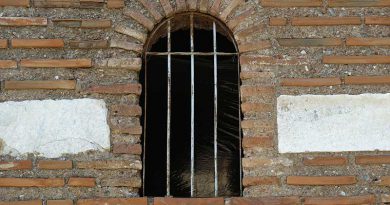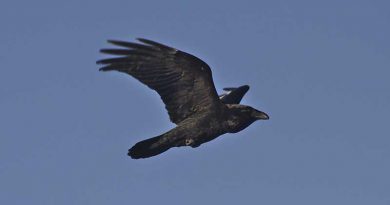Feet on the mountain
The chill seeped into my heart and darkness swept over my spirit as I sat in the depths of the ravine. The sense of isolation was overwhelming. Yet from somewhere above came an unlikely sound. At first I thought it an illusion but it grew undeniably real. Someone was singing – no, two people. Voices rose in harmony; their songs joyful; different in tone but sharing one theme. God is our salvation.
“The Lord lives. Blessed be my Rock, may the God of my salvation be exalted. I will sing joyfully to your Name.” Psalm 18:46,49.
“ I will rejoice in the Lord. I will be joyful in the God of my salvation. The sovereign Lord is my strength.” Habakkuk 3:18,19.
As I listened, I realised both singers had once been where I now sat. They knew all about life in this dark ravine.
“The grave wrapped its ropes around me. Death itself stared me in the face. But in my distress I cried out to the Lord.” Psalm 18:5,6.
“How long, O Lord, must I cry for help? But you do not listen! …. O lord my God, my Holy One, you who are eternal – is your plan in all of this to wipe us out? Surely not!” Habakkuk 1:2,12.
Listening even more carefully, I began to understand that the singers were on different paths. Both led out of the ravine and both paths were a difficult climb. Yet each singer told how he had been given special feet to enable him to climb – feet like the feet of a deer.
“It is God who arms me with strengthand keeps my way secure.He makes my feet like the feet of a deer;he causes me to stand on the heights.” Psalm 18:33
“He makes my feet like the feet of a deer,he enables me to tread on the heights.” Habakkuk 3:19.
Slowly it dawned on me that, though the songs were in harmony, exalting the same God and expressing their trust in Him, they were singing about two very different experiences.
One was a Song of deliverance; the singer lifted up his voice in praise. David sang this song to the Lord on the day the Lord rescued him from all his enemies and from Saul. (The prologue to Psalm 18)
The second was a Song of impending doom; the singer lifted up his voice in prayer. “This prayer was sung by the prophet Habakkuk.” Habakkuk 3:1.
The first singer had spent years seeking deliverance and had been given strength to overcome and ascend the steep path to a new experience of service for God.
“I love you, Lord, my strength. The Lord is my rock, my fortress and my deliverer; my God is my rock, in whom I take refuge, my shieldand the horn of my salvation, my stronghold. I called to the Lord, who is worthy of praise, and I have been saved from my enemies.” Psalm 18:1-3.
But the second singer had been shown that judgement was falling on God’s people because of their sin. The prophet was living a godly life but those who trust in God have no guarantee of health, wealth or safety. Habakkuk was aware he too could suffer when the Sovereign God did something unbelievable. The ungodly Babylonians were being sent against God’s own people!
‘O Lord my God, my Holy One, you who are eternal – surely you do not plan to wipe us out?O Lord, our Rock, you have sent these Babylonians to correct us, to punish us for our many sins.” Habakkuk 1:12. “In this time of our deep need, begin again to help us as you did in years gone by. Show us your power to save us and in your anger, remember your mercy.” Habakkuk 3:2.
I sat in the deepest gloom, listening to the songs and wondering at the strange providences of God. What had these singers to teach me? Had their songs a message I needed to hear? Could I ever sing like them?
The first singer was David who had spent so long being hunted by Saul. Now his feet were standing on the heights. The Lord had delivered him from his enemies and had “set him” and “caused him to stand” in high places. David’s name would be honoured and revered for all time. The man who had languished in the ravine would be crowned king over God’s people. David did not escape the ravine in his own strength; he did not reach the heights through a positive attitude or a persevering spirit. He climbed from the ravine to the throne because the Lord gave him the feet of a deer and made him “stand.” It was the Lord’s doing and all in God’s perfect time.
I learned that sometimes the Lord’s purpose is to deliver us from the deepest ravines and place us on the highest ground. He can bring restoration of relationships, grant healing from illness, cause recovery from ruin or send fulfilment in place of disappointment. When His time is right, He can change our whole circumstances. It is right to call out to Him; it is important to submit our ways to Him; it is blessed to hope in Him. He still delivers.
The second singer was the prophet Habakkuk. As he prayed, he knew what the future held. The Babylonians were coming and nothing was safe – maybe not even him. He knew God would judge the Babylonians when the time was right but not before He used them to bring havoc and death upon the Jews, who had sinned against Him. Yet, in all the fear and bewilderment, Habakkuk found grace to rejoice in God’s greatness, grace to pray for God’s mercy and grace to bow before God’s sovereignty. He lifted his voice in song:
“Even though the fig trees have no blossoms,and there are no grapes on the vines;
even though the olive crop fails,and the fields lie empty and barren;
even though the flocks die in the fields,and the cattle barns are empty,
yet I will rejoice in the Lord!I will be joyful in the God of my salvation!” Habakkuk 3:17,18.
We never hear of Habakkuk again. Perhaps he perished in the invasion or died of starvation in that ravaged land. He never reached the heights to which David rose, perhaps he never prophesied again. And yet, is his song not similar to David’s?
“He will make me as sure-footed as the deer and bring me safely over the mountains.” Habakkuk 3:19.
Did the Lord fail Habakkuk? Was his singing in vain? Was God’s plan spoiled? Listening closely to what both men sang helps us see that God gives the feet of a deer to all who seek to rise from the ravines of life with hope in Him.
But not all climbs out of the ravine have the same outcome. While David was “set” upon high places and “made to stand”, Habakkuk’s phrase indicates that God would help him “walk” on high places. And the word used for “walk” is also the word that describes the bending of a bow; it speaks of being stretched, stressed and squeezed. His “walk” would be stressful and painful but would bring him “safely over the mountains.” Habakkuk 3:20.
I learned that sometimes the way out of the ravine does not lead to restoration of relationships or recovery from ruin or healing from illness or bring fulfilment in place of disappointment. That business I once had may never be restored; that ministry I enjoyed may never return; that injury I suffered may never be repaired; the deepest yearning of my heart may not be met. The mountain above me may be tall and terrifying. In the thin air I might gasp for answers and never find any, for the summit may be perpetually shrouded in the mists of the mystery of Providence.
And I realised that one day I too might “know” that the way out will take me “over the mountains” to an entirely new life. I looked back and recalled the awesome privilege of holding the hands of friends who were about to leave their ravine and go over their mountain for the final time. They were given feet to walk on the heights. They showed me that, by God’s grace, I can still sing; I can still trust; I can still be “joyful in the God of our salvation” for He will give me the feet I need, however high the mountain He has placed before me and whichever path He asks me to walk.
I rose from the rock on which I had been sitting and, to my surprise, found myself singing softly some familiar words from David’s song. “The Lord lives. Blessed be my Rock, may the God of my salvation be exalted.” Psalm 18:46. In the darkness I moved cautiously forward with anticipation, testing my new feet. I was praying for deliverance, searching for a path and knowing in my heart, as David said, “As for God, His way is perfect… He will make my way perfect.” Psalm 18:30,33.
David McFarland 2012
Scripture references are from a variety of translations but primarily the New International Version and the New Living Translation.




